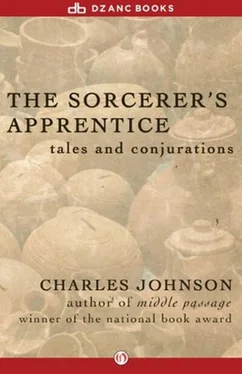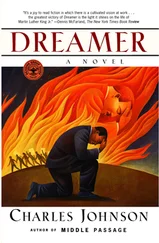Charles Johnson - Sorcerer's Apprentice
Здесь есть возможность читать онлайн «Charles Johnson - Sorcerer's Apprentice» весь текст электронной книги совершенно бесплатно (целиком полную версию без сокращений). В некоторых случаях можно слушать аудио, скачать через торрент в формате fb2 и присутствует краткое содержание. Год выпуска: 2014, Издательство: Dzanc Books, Жанр: Современная проза, на английском языке. Описание произведения, (предисловие) а так же отзывы посетителей доступны на портале библиотеки ЛибКат.
- Название:Sorcerer's Apprentice
- Автор:
- Издательство:Dzanc Books
- Жанр:
- Год:2014
- ISBN:нет данных
- Рейтинг книги:3 / 5. Голосов: 1
-
Избранное:Добавить в избранное
- Отзывы:
-
Ваша оценка:
- 60
- 1
- 2
- 3
- 4
- 5
Sorcerer's Apprentice: краткое содержание, описание и аннотация
Предлагаем к чтению аннотацию, описание, краткое содержание или предисловие (зависит от того, что написал сам автор книги «Sorcerer's Apprentice»). Если вы не нашли необходимую информацию о книге — напишите в комментариях, мы постараемся отыскать её.
Sorcerer's Apprentice — читать онлайн бесплатно полную книгу (весь текст) целиком
Ниже представлен текст книги, разбитый по страницам. Система сохранения места последней прочитанной страницы, позволяет с удобством читать онлайн бесплатно книгу «Sorcerer's Apprentice», без необходимости каждый раз заново искать на чём Вы остановились. Поставьте закладку, и сможете в любой момент перейти на страницу, на которой закончили чтение.
Интервал:
Закладка:
Undecided, but mercifully drunk now, his pipebowl too hot to hold any longer, Moses, who could not speak his mind to Harriet Bridgewater unless he’d tied one on, called out: “I come to a decision. Not about Mingo, but you’n’ me.” It was then seven o’clock. He shambled, feet shuffling, toward the door. “Y’know, I was gonna ask you to marry me this morning”—he laughed; whiskey made his scalp tingle—“but I figured living alone was better when I thoughta how married folks — and sometimes wimmin with dogs — got to favoring each other…like they was wax candles flowing tergether. Hee-hee.” He stepped gingerly, holding the bottle high, his ears brick red, face streaky from wind-dried sweat, back onto the quiet porch. He heard a moan. It was distinctly a moan. “Harriet? Harriet, I ain’t put it too well, but I’m asking you now.” On the porch her rocker slid back, forth, squeaking on the floorboards. Moses’s bottle fell— bip! — down the stairs, bounced out into the yard, rolled, and bumped into Harriet Bridge-water. Naw, he thought. Aw, naw. By the wagon, by a chopping block near a pile of split faggots, by the ruin of an old handpump caked with rust, she lay on her side, the back fastenings of her dress burst open, her mouth a perfect 0. The sight so wounded him he wept like a child. It was then seven-fifteen.
October 7 of the year of grace 1855.
Midnight found Moses Green still staring down at her. He felt sick and crippled and dead inside. Every shadowed object thinging in the yard beyond, wrenched up from its roots, hazed like shapes in a hallucination, was a sermon on vanity; every time he moved his eyes he stared into a grim homily on the deadly upas of race and relatedness. Now he had no place to stand. Now he was undone. “Mingo…come ovah heah.” He was very quiet.
“Suh?” The lanky African jumped down from the wagon, faintly innocent, faintly diabolical. Removed from the setting of Moses’s farm, the boy looked strangely elemental; his skin had the texture of plant life, the stones of his eyes an odd, glossy quality like those of a spider, which cannot be read. “Talky old hen daid now, boss.”
The old man’s face shattered. “I was gonna marry that woman!”
“Naw.” Mingo frowned. From out of his frown a huge grin flowered. “You say — I’m quoting you now, suh — a man needs a quiet, patient, uncomplaining woman, right?”
Moses croaked, “When did I say that?”
“Yesstiday.” Mingo yawned. He looked sleepy. “Go home now, boss?”
“Not just yet.” Moses Green, making an effort to pull himself to his full height, failed. “You lie face down — heah me? — with your hands ovah your head till I come back.” With Mingo hugging the front steps, Moses took the stairs back inside, found the flintlock Harriet kept in her cupboard on account of slaves who swore to die in the skin of freemen, primed it, and stepped back, so slowly, to the yard. Outside, the air seemed thinner. Bending forward, perspiring at his upper lip, Moses tucked the cold barrel into the back of Mingo’s neck, cushioning it in a small socket of flesh above the African’s broad shoulders. With his thumb he pulled the hammer back. Springs in the flintlock whined. Deep inside his throat, as if he were speaking through his stomach, he talked to the dark poll of the boy’s back-slanting head.
“You ain’t never gonna understand why I gotta do this. You a saddle across my neck, always will be, even though it ain’t rightly all your fault. Mingo, you more me than I am myself. Me planed away to the bone! Ya understand?” He coughed and went on miserably: “All the wrong, all the good you do, now or tomorrow — it’s me indirectly doing it, but without the lies and excuses, without the feeling what’s its foundation, with all the polite make-up and apologies removed. It’s an empty gesture, like the swing of a shadow’s arm. You can’t never see things exactly the way I do. I’m guilty. It was me set the gears in motion. Me…” Away in the octopoid darkness a wild bird — a nighthawk maybe — screeched. It shot noisily away with blurred wings askirring when the sound of hoofs and wagons rumbled closer. Eyes narrowed to slits, Moses said — a dry whisper—“Get up, you damned fool.” He let his round shoulders slump. Mingo let his broad shoulders slump. “Take the horses,” Moses said; he pulled himself up to his rig, then sat, his knees together beside the boy. Mingo’s knees drew together. Moses’s voice changed. It began to rasp and wheeze; so did Mingo’s. “Missouri,” said the old man, not to Mingo but to the dusty floor of the buckboard, “if I don’t misre-member, is off thataway somewheres in the west.”
EXCHANGE VALUE
Me and my brother, Loftis, came in by the old lady’s window. There was some kinda boobytrap — boxes of broken glass — that shoulda warned us Miss Bailey wasn’t the easy mark we made her to be. She been living alone for twenty years in 4-B down the hall from Loftis and me, long before our folks died — a hincty, half bald West Indian woman with a craglike face, who kept her door barricaded, shutters closed, and wore the same sorry-looking outfit — black wingtip shoes, cropfingered gloves in winter, and a man’s floppy hat — like maybe she dressed half-asleep or in a dark attic. Loftis, he figured Miss Bailey had some grandtheft dough stashed inside, jim, or leastways a shoebox full of money, ’cause she never spent a nickel on herself, not even for food, and only left her place at night.
Anyway, we figured Miss Bailey was gone. Her mailbox be full, and Pookie White, who run the Thirty-ninth Street Creole restaurant, he say she ain’t dropped by in days to collect the handouts he give her so she can get by. So here’s me and Loftis, tipping around Miss Bailey’s blackdark kitchen. The floor be littered with fruitrinds, roaches, old food furred with blue mold. Her dirty dishes be stacked in a sink feathered with cracks, and it looks like the old lady been living, lately, on Ritz crackers and Department of Agriculture (Welfare Office) peanut butter. Her toilet be stopped up, too, and, on the bathroom floor, there’s five Maxwell House coffee cans full of shit. Me, I was closing her bathroom door when I whiffed this evil smell so bad, so thick, I could hardly breathe, and what air I breathed was stifling, like solid fluid in my throatpipes, like broth or soup. “Coûter,” Loftis whisper, low, across the room, “you smell that?” He went right on sniffing it, like people do for some reason when something be smelling stanky, then took out his headrag and held it over his mouth. “Smells like something crawled up in here and died!” Then, head low, he slipped his long self into the living room. Me, I stayed by the window, gulping for air, and do you know why?
You oughta know, up front, that I ain’t too good at this gangster stuff, and I had a real bad feeling about Miss Bailey from the get-go. Mama used to say it was Loftis, not me, who’d go places — I see her standing at the sideboard by the sink now, big as a Frigidaire, white flour to her elbows, a washtowel over her shoulder, while we ate a breakfast of cornbread and syrup. Loftis, he graduated fifth at DuSable High School, had two gigs and, like Papa, he be always wanting the things white people had out in Hyde Park, where Mama did daywork sometimes. Loftis, he be the kind of brother who buys Esquire , sews Hart, Schaffner & Marx labels in Robert Hall suits, talks properlike, packs his hair with Murray’s; and he took classes in politics and stuff at the Black People’s Topographical Library in the late 1960s. At thirty, he make his bed military-style, reads Black Scholar on the bus he takes to the plant, and, come hell or high water, plans to make a Big Score. Loftis, he say I’m ’bout as useful on a hustle — or when it comes to getting ahead — as a headcold, and he says he has to count my legs sometimes to make sure I ain’t a mule, seeing how, for all my eighteen years, I can’t keep no job and sortâ stay close to home, watching TV, or reading World’s Finest comic books, or maybe just laying dead, listening to music, imagining I see faces or foreign places in water stains on the wallpaper, ’cause some days, when I remember Papa, then Mama, killing they-selves for chump change — a pitiful li’l bowl of porridge — I get to thinking that even if I ain’t had all I wanted, maybe I’ve had, you know, all I’m ever gonna get.
Читать дальшеИнтервал:
Закладка:
Похожие книги на «Sorcerer's Apprentice»
Представляем Вашему вниманию похожие книги на «Sorcerer's Apprentice» списком для выбора. Мы отобрали схожую по названию и смыслу литературу в надежде предоставить читателям больше вариантов отыскать новые, интересные, ещё непрочитанные произведения.
Обсуждение, отзывы о книге «Sorcerer's Apprentice» и просто собственные мнения читателей. Оставьте ваши комментарии, напишите, что Вы думаете о произведении, его смысле или главных героях. Укажите что конкретно понравилось, а что нет, и почему Вы так считаете.












